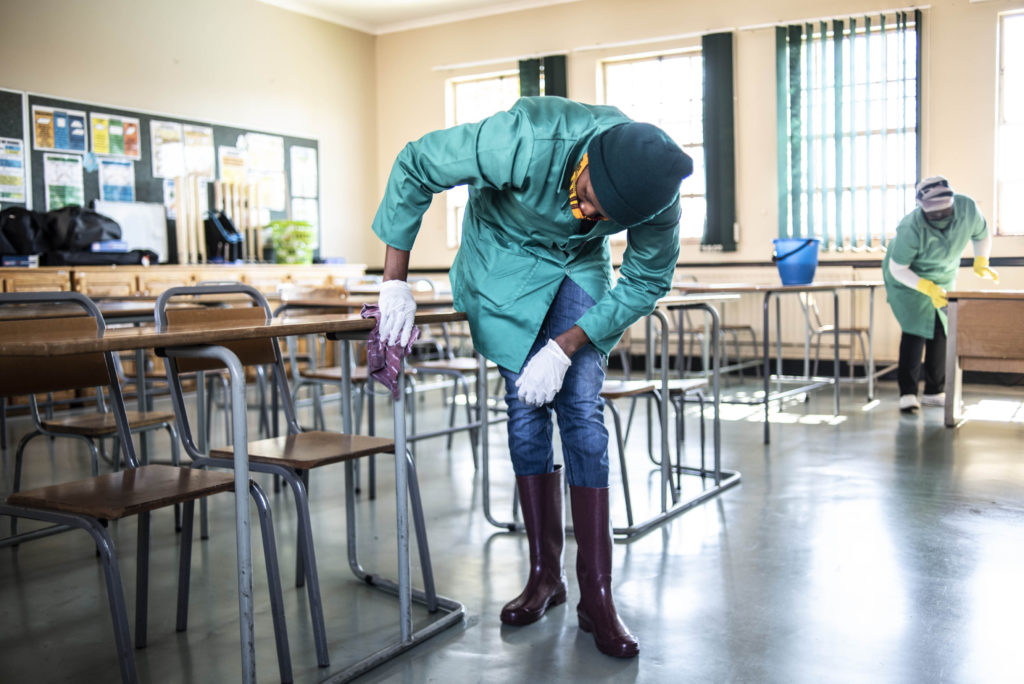Three fronts in South Africa’s battle against Covid-19 took most of our attention in June: the reopening of schools, the vast safety net of grants given to businesses and individuals affected by the measures taken to slow the spread of the virus, and medical treatment. The news coverage of these areas shows how we are struggling, and stumbling, in our attempts to handle the blows dealt by this pandemic.
In my online database of 70 top online news articles from June, the word “schools” was mentioned 173 times, while “Covid-19” received 160 mentions. The staggered reopening of schools has been a bone of contention and source of uncertainty since the end of May. Grades 7 and 12 were meant to go back to school on June 1, before this was postponed at the last minute to June 8. Basic Education Minister Angie Motshekga said on Sunday, June 7: “We can now say with confidence that about 95% of our schools have been ably provided with the Covid-19-related imperatives,” a statement quoted in three of the articles in the database. She also said: “We remain committed to the principle that all schools must be Covid-19 compliant and ready to open together.”
The minister’s language may have left many anxious parents and learners scratching their heads. What are “Covid-19-related imperatives”? What does “Covid-19 compliant” mean? Crucial announcements like these should be delivered in plainer language so people understand what is being said.
Now it’s a new month with a new backtrack on the question of which grades should go back to school. Grades R, 3, 6, 10 and 11 were meant to be going back on July 6, but on July 2 it was announced that only grades R, 6 and 11 would return, with the others being phased in later in July. KwaZulu-Natal announced that their grade Rs would not return on July 6.
Teacher unions have blamed the recent spike in Covid-19 infections on the reopening of schools, but paediatricians have explained that children are in fact safer in school than being left at home, and do not spread Covid-19 to the same extent that adults do. The department of basic education should be communicating more clearly, and helping to build the confidence of parents and learners with consistent and easy-to-understand messages in this confusing time.
On the economic front, Finance Minister Tito Mboweni was the most talked-about person in my online news database, with 55 mentions, as he presented his Covid-19 emergency budget. There is no disputing the damage that Covid-19 has done to our already struggling economy. The database included five mentions of the word “impact” occurring in conjunction with “Covid-19”. Four of them referred to the virus’s effect on the economy, and one of them to its effect on people’s lives in general.
In particular, the allocation and (ab)use of Covid-19 relief grants has been in the spotlight, with “relief” being a word often associated with “Covid-19” in the database for this reason. One exposé described how the National Prosecuting Authority froze 28 bank accounts after R5.7-million from a labour broker’s Unemployment Insurance Fund Temporary Employer/Employee Relief Scheme claim went into the pockets of one Tshwane man. Another article revealed that the high court in Pretoria instructed the government to pay out the R350 Covid-19 relief grant to asylum-seekers, at an estimated cost of R700-million. Although this was a costly decision, it is only just and fair to assist these people, who are in the country not by choice but out of necessity.
Last, the wrangles over relief for the taxi industry have grabbed headlines. The South African National Taxi Council continues to encourage taxi operators to fill their vehicles to capacity until they are happy with the government’s relief deal for the industry, giving plenty of opportunities for Covid-19 super-spreading events.
All this illustrates that these times call for exceptional levels of integrity and for a sense of ubuntu to permeate our financial dealings. We need to be prepared to accept our own share of the belt-tightening necessary at this time so that others can also have financial relief.
On the medical front, it is unnecessary to repeat the horror stories of overstretched hospitals and fearful staff that have been reported on over the past few weeks. In my database, “wards” showed a strong association with “Covid-19”, because of one article that spoke about how only doctors and nursing staff in Covid-19 wards were receiving adequate protective equipment in some Cape Town government hospitals, while those working in wards with unconfirmed cases of the virus had to make do with less. The same article talked about rotation of staff between Covid-19 and non-Covid-19 wards, increasing the risk of infection. Government health care workers in Cape Town spoke of being overwhelmed, and that was already on June 18. Since then, Eastern Cape Premier Oscar Mabuyane has admitted that hospitals there are also “overwhelmed”, and the South African National Defence Force’s medical team has stepped in to help there.
Minister of Health Zweli Mkhize has received praise for his handling of the pandemic, but Covid-19 has exposed the systemic weaknesses of the public health system. There is a clear call to provincial health department officials, hospital administrators and others to make sure that they give frontline medical staff all the support they need so that lives may be saved.
A book I read two years ago, The New Economy by Thabo Mahlobo, raised the thought-provoking question: Can you be entrusted with an economic crisis? Our generation of South Africans has been entrusted with not just an economic crisis but an all-encompassing crisis of global proportions — and I have not even touched on what President Cyril Ramaphosa called the second pandemic of gender-based violence that we face concurrently. What will we do with this crisis? How will we steward our resources to take care of those affected? One thing is clear: this crisis demands the best from us.



